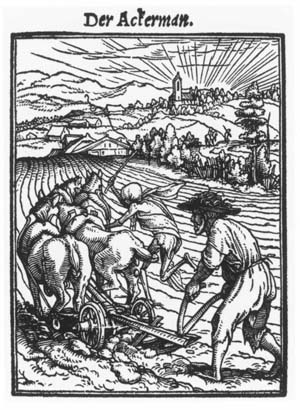| The heresy that there is only one life was a crucial step in the British people's struggle to assert its right to think for itself... |
Death comes alive: the end of the afterlife
WORKERS, FEB 2006 ISSUE
One of the most important native English heresies was the idea that when a person died that was it, they died. Or in a milder form, their soul slept until humanity arose from the condition of exploitation. Either way, the English tradition of appreciating that all things die was profoundly revolutionary, and always linked to the struggle for social change, science and culture.
Radicals who believed in this "mortalist" idea – first expressed, perhaps, by William Tyndale, who translated the Bible into English in the early 16th century – were considered by all others, including the grandees of the Reformation, beyond the pale. And rightly so. To say when you're dead, you're dead, challenges all religious ideas of whatever denomination. It represents the beginning of fighting for a decent collective life on earth. Animals live on earth, but the idea that you died and could return as an animal did not take hold in a land that had dealt with its tribal and pre-agricultural heritage quite early on.
Mortalism was a long-standing intellectual tradition in England that gained a simple expression at the time the first trade unions were born. William Blake wrote in The Everlasting Gospel, around 1810: "Thou art a man: God is no more: Thy own humanity learn to adore."

The Ploughman, from Holbein's Dance of Death
Where did it come from?
But more interestingly where did it come from in the first place? It was a humanist tradition, which stemmed from the survivors of defeated peasant rebellions of the 1380s who recognised that the struggle to improve things on this earth was the primary thing and any illusion that there was another world to fight for was daft. This was especially sharp in their minds as they had seen monarchy and Church, believers in this other world, disembowel their fellow rebels.
Around the same time, a group called the Lollards, interestingly one of the first to respect women's democratic political contributions, was also one of the first to disseminate this simple idea. Humanity, not divinity, forced its way onto the agenda through them and many other craftsmen and enlightened peasants who had endured the mud and superstition. Instead of rewards and punishments bestowed by the church, society was really controlled by the consciences of people. The Muggletonians, who arose in the aftermath of the English Civil war and were also knows as radical Puritan, and who were by far the most revolutionary force ever known in England until the formation of a Communist Party, particularly extended the logic of the death of the afterlife into all aspects of morality and behaviour. In so doing, they paved the philosophical way for English materialism.
At death the body returns to the elements, hence no such thing as heaven, purgatory, or hell. This thinking laid the basis of opposition to Catholicism, and was also essentially scientific. The Bible, once a source of external control, could then be made into poetry, an allegory, an account in reality of human beings and their beliefs, rather than a creed or a dogma.
Many woodcuts survive from the medieval period called The Dance of Death. The most famous sequence is by Holbein. What you should look out for are firstly those sequences which try and frighten you by the thought of death to make you "obey the priests and the Church or when you die you will go to hell", and on the other hand those sequences which depict death as a liberated happy character levelling the rich and undermining existing social hierarchies. One tradition stems from the feudal ruling class and its clergy; the other comes from the feudal socialist tradition.
One early expression of this thinking would be the opposition to church marriage. The most precious bond of social relations would be formed in a civil, non-religious ceremony. People came together in the eyes of friends and society not in the eyes of non-existent gods. The poor old Church of England has been seeking to recoup the ground, and donations to the offertory, ever since.
Interestingly, a sect that combined such views was called the Familists, early dissenters who arose in the mid-1550s. In turn their ideas greatly influenced the progressive forces in the mid-16th century who in turn influenced the revolutionary forces of the English Civil War. Remember, throughout the period people holding such views were hideously tortured in the name of God. There was about a 400-year Inquisition in England, Scotland and Wales with thousands of progressive people being slaughtered for their views.
The trends called humanism, the Reformation and then the Enlightenment, were pale reflections of deep-seated and forcefully revolutionary ideas. A few fanatics apart, who really believes God created the earth and who really believes that there is a heaven and a hell?
In a future issue of Workers we will look at the origins of religion itself and the reason why it continues to replicate itself long after its reasons for being have gone.